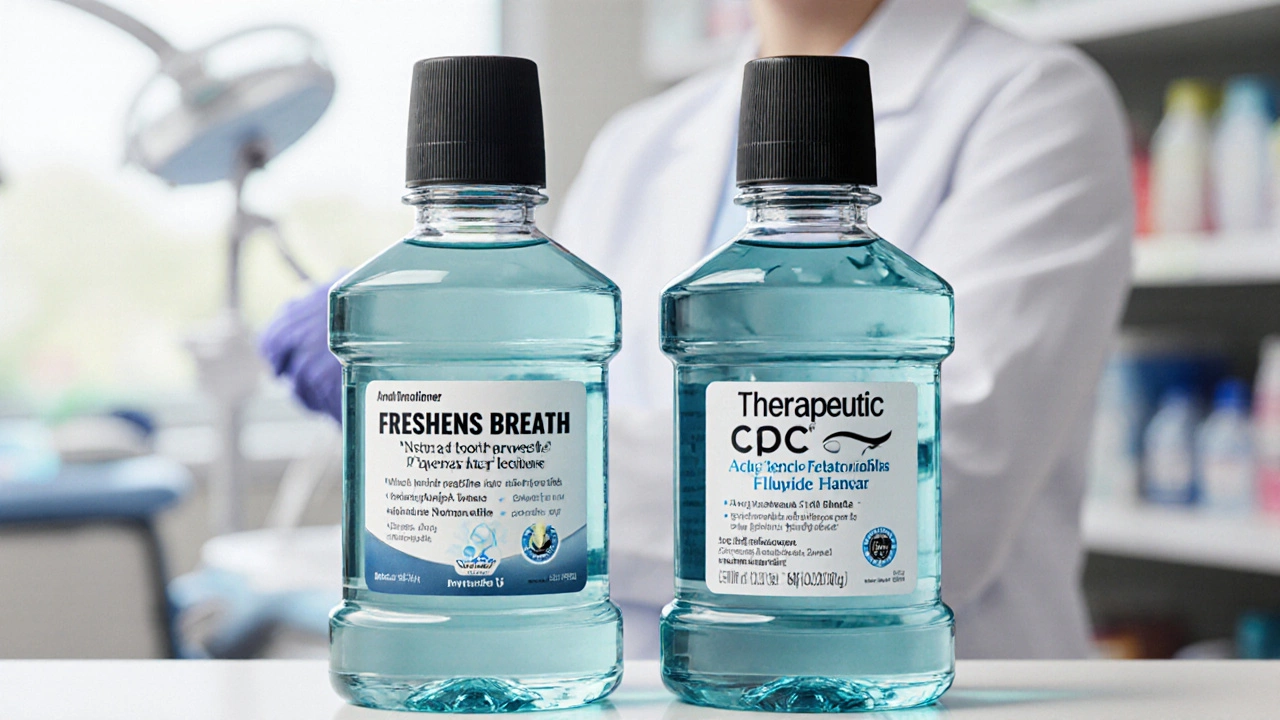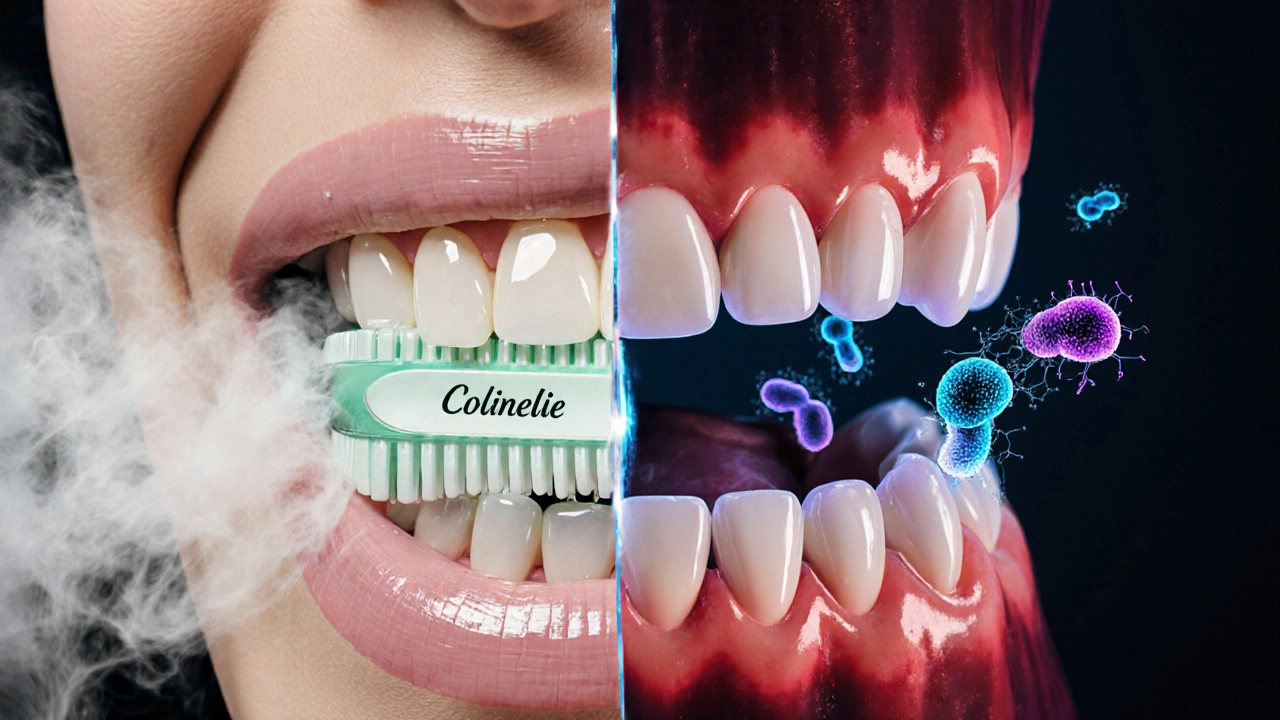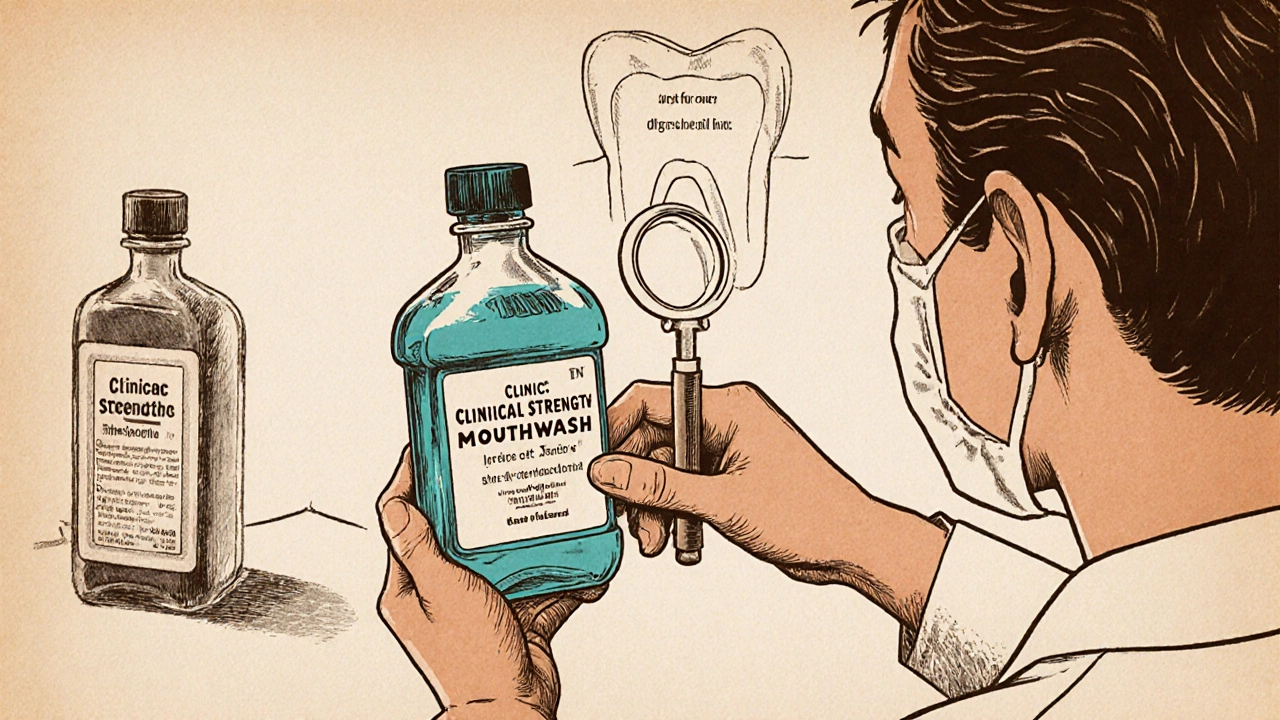
When you pick up a bottle of mouthwash at the store, it sits right next to lotions, serums, and perfumes. It smells nice, it freshens your breath, and it claims to make your mouth feel cleaner. So naturally, you might think: is mouthwash a cosmetic product? The answer isn’t as simple as it looks. It depends on what the manufacturer says it does - and what the law says it can claim.
What Makes Something a Cosmetic?
The U.S. Food and Drug Administration (FDA) defines a cosmetic as a product intended to cleanse, beautify, promote attractiveness, or alter the appearance without affecting the body’s structure or function. That includes things like lipstick, shampoo, deodorant, and facial cleansers. If your mouthwash only claims to freshen breath or leave a minty taste, then yes - it’s classified as a cosmetic.
But here’s where it gets tricky. Many mouthwashes don’t stop at freshness. They say they reduce plaque, fight gingivitis, kill germs, or prevent cavities. Those aren’t cosmetic claims. Those are drug claims. And once a product makes a drug claim, it’s no longer just a cosmetic. It becomes a drug - or a combination product.
When Mouthwash Becomes a Drug
Look at the back of your mouthwash bottle. If you see ingredients like fluoride, chlorhexidine, cetylpyridinium chloride (CPC), or essential oils listed as active ingredients, that’s a sign it’s designed to treat or prevent disease. Fluoride strengthens enamel. Chlorhexidine kills bacteria that cause gum disease. CPC reduces plaque buildup. These aren’t there for fragrance. They’re there to change how your mouth works.
In Australia, the Therapeutic Goods Administration (TGA) has similar rules. Products that make therapeutic claims - like ‘reduces gum inflammation’ or ‘helps prevent tooth decay’ - must be listed or registered as therapeutic goods. That means they go through safety and efficacy testing, just like prescription or over-the-counter medicines.
So if your mouthwash says it ‘fights cavities’ or ‘treats gingivitis,’ it’s not a cosmetic. It’s a drug. And that changes everything: how it’s made, how it’s tested, and how it’s sold.
Why the Distinction Matters
You might wonder why this classification even matters. After all, you’re just trying to keep your breath fresh and your teeth clean. But the difference affects safety, regulation, and what you can expect from the product.
Cosmetic mouthwashes don’t need to prove they work beyond their aesthetic claims. They can’t make medical promises. That means a basic rinse labeled as a cosmetic might do nothing more than mask bad breath with strong mint flavor. It won’t reduce bacteria or strengthen enamel.
On the other hand, therapeutic mouthwashes are held to higher standards. They must show clinical proof that their active ingredients deliver results. That’s why dentists recommend certain brands - they’ve been tested in trials with real patients. A 2023 Cochrane review found that mouthwashes with chlorhexidine reduced plaque by up to 56% over six weeks compared to placebo rinses.
If you’re using mouthwash to manage gum disease or prevent decay, you need the kind that actually works. Relying on a cosmetic-only rinse could give you a false sense of security.

What’s on the Label Tells You Everything
Here’s how to tell at a glance what kind of mouthwash you’re holding:
- Cosmetic mouthwash: Claims like ‘freshens breath,’ ‘leaves mouth feeling clean,’ ‘delicious mint flavor.’ No active ingredients listed. Often sold in grocery stores or discount aisles.
- Therapeutic mouthwash: Lists active ingredients (fluoride, CPC, chlorhexidine, essential oils). Claims like ‘reduces plaque,’ ‘helps prevent gingivitis,’ ‘strengthens enamel.’ May say ‘therapeutic’ or ‘clinical strength’ on the bottle. Often found in pharmacies or recommended by dentists.
Check the ‘Drug Facts’ panel - if it’s there, it’s a drug. If it’s not, and the label only talks about taste and freshness, it’s a cosmetic.
Common Misconceptions
Many people think all mouthwashes are the same. They assume ‘antibacterial’ means ‘medicinal,’ or that ‘natural’ means ‘safe and effective.’ But natural doesn’t equal therapeutic. A mouthwash made with tea tree oil or aloe vera might smell pleasant, but unless it’s proven to reduce bacteria or plaque, it’s still just a cosmetic.
Another myth: ‘More alcohol = better cleaning.’ Alcohol-based rinses can dry out your mouth and irritate tissues. They’re not necessarily more effective than alcohol-free formulas with CPC or fluoride. In fact, the American Dental Association (ADA) approves dozens of alcohol-free mouthwashes for their clinical benefits.
And don’t confuse ‘whitening’ mouthwashes with actual teeth whitening. Most whitening rinses only remove surface stains over time. They won’t change the color of your enamel like professional bleaching. That’s a cosmetic effect - not a structural change.

What Should You Use?
If your goal is just to feel fresh after brushing, a basic cosmetic rinse is fine. But if you have sensitive gums, a history of cavities, or you’re prone to plaque buildup, you need something stronger.
Dentists in Sydney and across Australia commonly recommend mouthwashes with fluoride for cavity prevention, especially for people who drink bottled water (which often lacks fluoride). For gum health, products with CPC or chlorhexidine (used short-term) are proven to help.
Don’t rely on mouthwash to replace brushing and flossing. It’s an add-on, not a substitute. But when used correctly, a therapeutic mouthwash can cut your risk of gum disease by up to 30%, according to a 2022 study in the Journal of Clinical Periodontology.
The Bottom Line
Is mouthwash a cosmetic product? Sometimes. But most of the time, the ones people actually use for oral health aren’t. They’re regulated as drugs because they do more than just smell good. The label tells you the truth - if you know how to read it.
Choose based on your needs, not the packaging. If you want fresh breath, go for a cosmetic rinse. If you want to protect your teeth and gums, choose one with active, clinically proven ingredients. Don’t let the scent fool you - what matters is what’s inside.
Is mouthwash considered a cosmetic under Australian law?
In Australia, mouthwash is classified by the Therapeutic Goods Administration (TGA). If it only claims to freshen breath or improve appearance, it’s a cosmetic. But if it makes claims like reducing plaque, fighting gum disease, or preventing cavities, it’s considered a therapeutic good - meaning it’s regulated like a medicine.
Can I use cosmetic mouthwash instead of brushing my teeth?
No. Cosmetic mouthwash does not remove plaque or clean teeth. It may mask bad breath, but it doesn’t replace brushing or flossing. Only mechanical cleaning with a toothbrush and dental floss can physically remove plaque buildup. Mouthwash is a supplement, not a substitute.
What’s the difference between fluoride and alcohol in mouthwash?
Fluoride strengthens tooth enamel and helps prevent cavities - it’s a therapeutic ingredient. Alcohol is often used as a solvent or to kill surface bacteria, but it doesn’t prevent decay. Alcohol can also dry out your mouth, which may increase bad breath over time. Many effective mouthwashes today are alcohol-free and still clinically proven.
Are natural mouthwashes better than regular ones?
Not necessarily. ‘Natural’ doesn’t mean ‘effective.’ A mouthwash with essential oils or herbal extracts may smell nice, but unless it’s proven in clinical trials to reduce plaque or gingivitis, it’s just a cosmetic. Look for the ADA Seal of Acceptance or TGA listing - those mean the product has been tested for real results.
Why do some mouthwashes say ‘for cosmetic use only’?
That label means the manufacturer is avoiding drug regulations. They’re making no claims about treating disease or preventing cavities. These products are cheaper to produce and don’t need clinical testing. They’re fine for fresh breath, but they won’t improve your oral health beyond that.
If you're unsure which mouthwash to choose, ask your dentist. They know what’s clinically proven and what’s just marketing. Your oral health isn’t a beauty routine - it’s a medical one. Choose accordingly.
 Hair Care
Hair Care